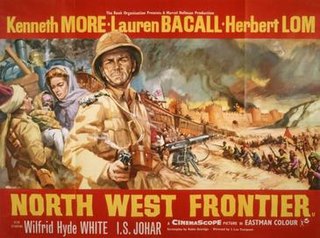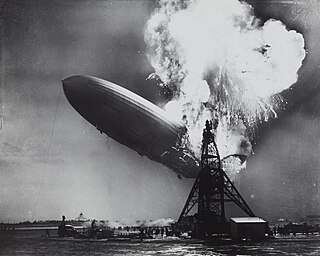Related Research Articles
Douglas Fader CV is one of only 20 recipients of the Cross of Valour, awarded for acts of the most conspicuous courage in circumstances of extreme peril and the highest award for bravery which can be presented to a Canadian civilian.

North West Frontier is a 1959 British Eastmancolor adventure film starring Kenneth More, Lauren Bacall, Herbert Lom, Wilfrid Hyde-White and I. S. Johar. The CinemaScope film was produced by Marcel Hellman and directed by J. Lee Thompson. It was a commercial success at the British box-office in 1959. The film's success led to J. Lee Thompson beginning his American career as a director.

The Bath School disaster, also known as the Bath School massacre, was a series of violent attacks perpetrated by Andrew Kehoe upon the Bath Consolidated School in Bath Charter Township, Michigan, United States, on May 18, 1927. The attacks killed 38 children and 6 adults, and injured at least 58 other people. Prior to the explosions at the school, Kehoe had murdered his wife, Nellie Price Kehoe, and firebombed his farm. Arriving at the site of the school explosion, Kehoe died when he set off explosives concealed in his truck.

R.P. Resor was a tanker ship built in 1936 by the Federal Shipbuilding and Drydock Company of Kearny, New Jersey for the Standard Oil Company. She was torpedoed by the German U-boat U-578 on 28 February 1942 and later sank.
The Los Alfaques disaster was caused by the explosion of a road tanker near a holiday campsite on 11 July 1978 in Alcanar, Spain. The exploding truck, which was carrying 23 tons of highly flammable liquefied propylene, killed 215 people and severely burned 200 more. Several individuals from the company that owned the vehicle were prosecuted for criminal negligence. The disaster resulted in new legislation in Spain, restricting the transit of vehicles carrying dangerous cargo through populated areas to night time only.

The Dunmurry train bombing was a premature detonation of a Provisional Irish Republican Army (IRA) incendiary bomb aboard a Ballymena to Belfast passenger train service on 17 January 1980.
Captain George Preston Stronach GC of the Merchant navy was awarded the George Cross for the heroism he displayed in a rescue at sea in Tripoli Harbour on 19 March 1943. Notice of his award appeared in the London Gazette on 23 November 1943.

Hydrogen safety covers the safe production, handling and use of hydrogen, particularly hydrogen gas fuel and liquid hydrogen. Hydrogen possesses the NFPA 704's highest rating of four on the flammability scale because it is flammable when mixed even in small amounts with ordinary air. Ignition can occur at a volumetric ratio of hydrogen to air as low as 4% due to the oxygen in the air and the simplicity and chemical properties of the reaction. However, hydrogen has no rating for innate hazard for reactivity or toxicity. The storage and use of hydrogen poses unique challenges due to its ease of leaking as a gaseous fuel, low-energy ignition, wide range of combustible fuel-air mixtures, buoyancy, and its ability to embrittle metals that must be accounted for to ensure safe operation.

The Soham rail disaster occurred on 2 June 1944, during the Second World War, when a fire developed on the leading wagon of a heavy ammunition train. The wagon contained a quantity of high explosive bombs. The train crew had detached the wagon from the rest of the train and were drawing it away when the cargo exploded. The fireman of the train and the signalman at Soham signalbox were killed and several other people injured. The driver, Benjamin Gimbert, and fireman, James Nightall, were both awarded the George Cross for preventing further damage which would have occurred if the rest of the train had exploded.

The Langenweddingen rail disaster near Magdeburg in East Germany caused 94 deaths. It occurred on 6 July 1967 at the village of Langenweddingen, today part of the Sülzetal municipality, on the Magdeburg–Thale railway in the then East Germany when a bilevel train struck a fuel tanker, which exploded as a result of the collision, at a level crossing of Highway 81.
MV Dromus was a 1930s British oil tanker owned by Anglo-Saxon Petroleum, a British subsidiary of Royal Dutch Shell. She was launched in September 1938 by Harland and Wolff at Belfast in Northern Ireland. She was one of a class of 20 similar tankers built for Anglo-Saxon.

John Sedgwick Gregson, GC was an apprentice in the British Merchant Navy who was awarded the Albert Medal during the Second World War. This was later replaced with the George Cross.
The 1991 New Zealand bravery awards were announced via a Special Honours List dated 19 December 1991. Twelve of the 33 recipients were recognised for acts of bravery during the Aramoana Massacre on 13 November 1990.
The 1987 New Zealand bravery awards were announced via a Special Honours List on 27 August 1987, and recognised ten people for acts of bravery between 1984 and 1986.
The 1984 New Zealand bravery awards were announced via a Special Honours List on 13 December 1984, and recognised ten people for acts of bravery between 1982 and 1984.
The 1999 New Zealand bravery awards were announced via a special honours list on 23 October 1999. The awards recognised 30 people, including six posthumously, for acts of bravery between 1989 and 1998.
The 2005 New Zealand bravery awards were announced via a special honours list on 29 January 2005, and recognised 26 people, including four posthumously, for acts of bravery between 1999 and 2004.

On 18 December 2022, a tanker truck exploded in the Salang Tunnel in Afghanistan, killing at least 31 people.
The Boksburg explosion took place on 24 December 2022, when a fuel tanker carrying liquefied petroleum gas (LPG) exploded underneath a railway bridge in Boksburg, in the Ekurhuleni Metropolitan Municipality in Gauteng, South Africa, with a death toll of 41 people as of 18 January 2023. Nearby infrastructure was damaged by the explosion.
References
- ↑ General, Office of the Secretary to the Governor. "Mr. Kenneth Wilfrid Bishop". The Governor General of Canada. Retrieved 2023-02-24.